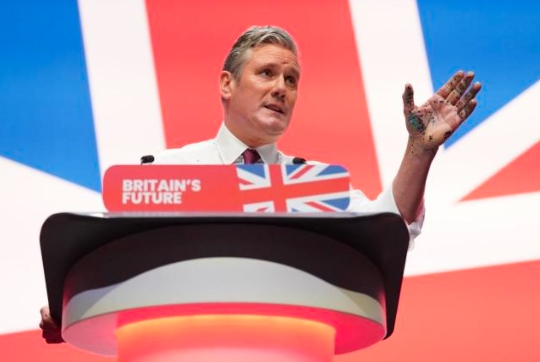Labour leader sets out a “serious, positive” vision for Britain
Keir Starmer, the leader of the Labour Party, delivered his keynote speech at the party’s conference in Liverpool on Wednesday. He addressed a range of issues, from the cost of living crisis to the climate emergency, and made a direct appeal to Conservative voters who are disillusioned with Boris Johnson’s government.
Starmer also outlined his plans to “bulldoze” his way through the obstacles that prevent Britain from becoming a modern, prosperous and fair country. He promised to invest in public services, infrastructure, innovation and skills, and to create a new partnership between the state and the private sector.
The speech was well received by one of the UK’s most influential right-wing think tanks, the Adam Smith Institute, which praised Starmer for setting out a “serious, positive” vision for the country. The think tank said Starmer was right that “politics should tread lightly on people’s lives” and that he showed a willingness to reform public services to make them work better for the people who use them.
Starmer invites Tory voters to join Labour
One of the most striking parts of Starmer’s speech was his direct pitch to Conservative voters who are unhappy with the direction of their party. He said he understood their frustration and anger at seeing their party “descend into the murky waters of populism and conspiracy”.

He invited them to join Labour, saying: “You have a home in the Labour Party. A party that shares your values. A party that will put you first.”
Starmer also criticised Johnson for his handling of the Covid-19 pandemic, Brexit and the economy. He accused him of being a “showman” who is good at slogans but bad at delivery. He said Johnson had broken his promises to “level up” the country, to protect the NHS and to get Brexit done.
He contrasted his own leadership style with Johnson’s, saying: “I don’t play games. I don’t do culture wars. I don’t pick fights with people I should be working with. I do what is right for our country.”
Starmer vows to tackle the climate crisis
Another key theme of Starmer’s speech was his commitment to tackle the climate crisis and to lead a green industrial revolution. He said Labour would set a target of net zero emissions by 2030, and would invest in renewable energy, electric vehicles, hydrogen and carbon capture.
He also said Labour would create millions of green jobs and would ensure a just transition for workers and communities affected by the shift to a low-carbon economy. He said: “We will not leave anyone behind. We will take everyone with us.”
Starmer also criticised the government for its lack of ambition and action on climate change, especially ahead of the COP26 summit in Glasgow next month. He said Johnson had failed to show global leadership and had alienated key allies such as France and the US.
He said Labour would work with other countries to secure a meaningful agreement at COP26, and would uphold Britain’s moral duty to help developing nations cope with the impacts of climate change.
Starmer pledges to end VAT exemption for private schools
One of the most controversial proposals in Starmer’s speech was his pledge to end the VAT exemption for private schools, which he said was unfair and unjustified. He said Labour would use the money raised from this measure to fund free school meals for all primary school children.
He said: “It cannot be right that we have one rule for those who can afford it, and another rule for everyone else. It cannot be right that some children get a head start, while others get left behind.”
He also said Labour would reverse the cuts to school budgets made by the Conservative government, and would invest in teacher training, curriculum reform and mental health support.
He said: “Education is not only a right, it is an opportunity. An opportunity to unlock every child’s potential. An opportunity to build a better future for our country.”
Starmer faces challenges from within and without
Despite delivering a confident and coherent speech, Starmer still faces significant challenges from both within and outside his party. He has struggled to unite his party after a bitter leadership contest last year, and has faced criticism from some factions for his stance on Brexit, Covid-19 restrictions and internal democracy.
He has also failed to make significant inroads in the opinion polls, which show Labour trailing behind the Conservatives by several points. He has not yet managed to convince many voters that he is a credible alternative to Johnson, or that he has a clear vision for the country.
He also faces a resurgent SNP in Scotland, which is pushing for another independence referendum, and a revived Liberal Democrats in England, which is targeting centrist voters who are disillusioned with both main parties.
Starmer will need to overcome these challenges if he wants to fulfil his ambition of becoming the next prime minister. He ended his speech by saying: “We can do this. We can change our country for the better. We can make Britain the best place to grow up in and the best place to grow old in.”
But will he be able to persuade enough people to share his optimism and his vision? That is the question that will determine his fate and the fate of his party.


















